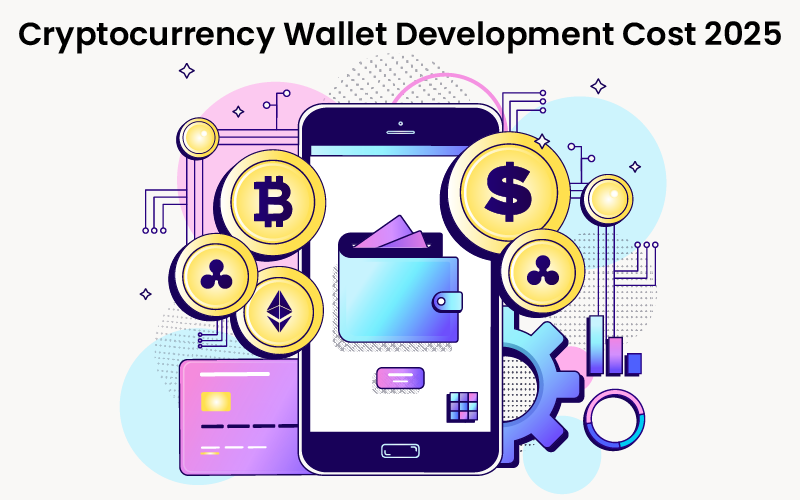Cryptocurrency Wallet Development Cost 2025

The cryptocurrency market continues to grow at an unprecedented rate, and cryptocurrency wallets play a crucial role in the ecosystem. Cryptocurrency Wallet Development Cost 2025 – Whether you’re an entrepreneur looking to develop a wallet for your business or an individual curious about the costs involved, understanding the factors influencing cryptocurrency wallet development in 2025 is essential.
This comprehensive guide delves into the key cost components, features, and trends shaping cryptocurrency wallet development in 2025.
What is a Cryptocurrency Wallet?
A cryptocurrency wallet is a digital tool that allows users to store, manage, and transact cryptocurrencies securely. Wallets can be categorized into two main types:
- Hot Wallets: Connected to the internet, providing quick access but with potential security risks (e.g., mobile apps, web wallets).
- Cold Wallets: Offline wallets offering enhanced security, often used for long-term storage (e.g., hardware wallets, paper wallets).
Key Features of Cryptocurrency Wallets in 2025
The features of a cryptocurrency wallet significantly impact its development cost. Here are the must-have and advanced features to consider:
Must-Have Features:
- User Registration and Login: Secure user authentication methods such as two-factor authentication (2FA) or biometric login.
- Multi-Currency Support: The ability to store and transact multiple cryptocurrencies.
- QR Code Scanner: Simplifies sending and receiving payments.
- Transaction History: A detailed record of all transactions.
- Wallet Backup and Recovery: Options to secure funds in case of device loss or theft.
Advanced Features:
- Cross-Chain Compatibility: Enables transactions across different blockchain networks.
- Decentralized Finance (DeFi) Integration: Supports staking, lending, and borrowing.
- NFT Support: Manages Non-Fungible Tokens (NFTs).
- In-Wallet Crypto Exchange: Allows users to trade cryptocurrencies without leaving the wallet.
- AI-Powered Fraud Detection: Enhances wallet security by identifying suspicious activity.
- Custom UI/UX Design: Tailored interfaces for branding and user experience.
Factors Influencing Cryptocurrency Wallet Development Cost
Several factors determine the overall cost of developing a cryptocurrency wallet. Let’s break them down:
1. Type of Wallet
- Web Wallets: $20,000 – $40,000
- Mobile Wallets: $40,000 – $100,000
- Desktop Wallets: $50,000 – $120,000
- Hardware Wallets: $100,000 and above (excluding manufacturing costs)
2. Features and Complexity
The more advanced the features, the higher the development cost. For instance, adding NFT support or DeFi integration increases the cost significantly.
3. Security Features
Enhanced security measures, such as multi-signature functionality and biometric authentication, require additional resources and expertise, driving up costs.
4. Blockchain Type
Developing a wallet for a single blockchain (e.g., Ethereum) is more cost-effective than creating a cross-chain wallet.
5. Development Team Location
- North America: $150 – $250/hour
- Europe: $100 – $200/hour
- Asia: $40 – $100/hour
6. Maintenance and Updates
Post-launch maintenance, bug fixes, and updates are ongoing costs that should be factored in. Expect to allocate 20-30% of the initial development cost annually.
Development Process for Cryptocurrency Wallets
Understanding the wallet development process can help estimate costs more accurately:
- Requirement Analysis: Define the wallet’s purpose, target audience, and features.
- UI/UX Design: Create a user-friendly and visually appealing interface.
- Development: Build the wallet’s front-end and back-end, integrating blockchain APIs.
- Testing: Conduct rigorous testing to identify and fix bugs.
- Deployment: Launch the wallet on app stores or as a web application.
- Maintenance: Provide ongoing support and updates.
Trends in Cryptocurrency Wallet Development by 2025
- Integration with Web3 Ecosystems: Wallets will serve as gateways to decentralized applications (dApps) and the broader Web3 landscape.
- Increased Adoption of Multi-Chain Wallets: Cross-chain compatibility will become a standard feature.
- Focus on Enhanced Privacy: Wallets will implement privacy-focused protocols, such as zk-SNARKs, to ensure user anonymity.
- Biometric and AI Security: Advanced authentication and AI-driven security will dominate the market.
- Tokenized Asset Management: Wallets will support tokenized real-world assets, including real estate and stocks.
Conclusion
The cost of developing a cryptocurrency wallet in 2025 will depend on the wallet type, features, and security measures. While simple wallets may cost $20,000 to $50,000, advanced wallets with cross-chain compatibility, NFT support, and DeFi features can exceed $150,000. Collaborating with experienced developers and clearly defining your project’s requirements will help you create a wallet that meets your needs while staying within budget.
For businesses looking to enter the cryptocurrency wallet market, partnering with a trusted development company like CryptoExchange4U can simplify the process. With expertise in blockchain solutions and wallet development, CryptoExchange4U can help you create a secure, feature-rich wallet tailored to your goals.
Start your wallet development journey with CryptoExchange4U and make your mark in the ever-evolving crypto ecosystem!

